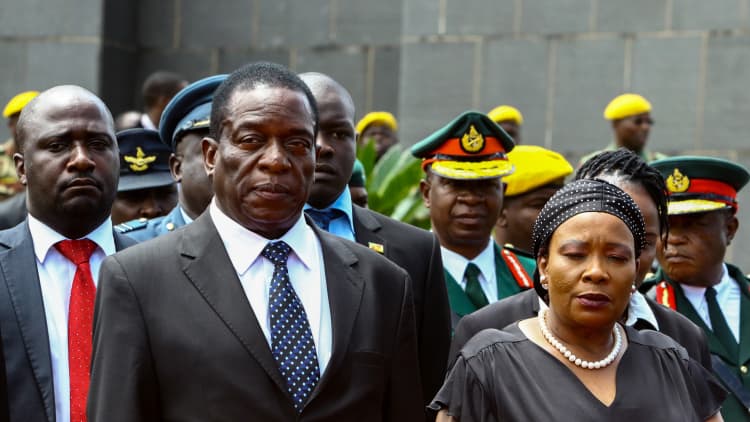Zimbabwe’s historic election on July 30, its first without former leader Robert Mugabe on the ticket in nearly four decades, is a major olive branch aimed at the West.
President Emmerson Mnangagwa, who took power last November, is attempting to bring the southern African pariah state back into the international community and repair its crumbling economy, destroyed by years of mismanagement.
But, during Zimbabwe’s international isolation it found an unusual friend — North Korea.
How did this come about?
Zimbabwe and North Korea’s relationship dates back to the Cold War, during which Pyongyang backed several liberation movements in Africa.
During the 1970s, North Korea trained an armed faction of Zimbabwe’s now-ruling ZANU-PF party as it fought to oust white minority rule in the country, which was then the British colony of Rhodesia.
When former Zimbabwean President Robert Mugabe was elected into power in 1980 following the country’s independence, military training from North Korea became more closely linked to its leadership. Mugabe agreed with then-North Korean leader Kim Il Sung that Pyongyang would train a wing of Zimbabwe’s army, known as the Fifth Brigade, which would be under the direct control of Mugabe himself as he sought to consolidate his power in the country.
“The Fifth Bridgade had a reputation for ferocity,” Daragh Neville, an Africa-North Korea expert formerly of think tank Chatham House, told CNBC. It is considered responsible for a 1983 massacre in Matabeleland, a western region of Zimbabwe, in which up to 20,000 people were killed in violence along tribal lines.
“What happened in Matabeleland remains an extremely sensitive topic in Zimbabwe,” Neville said.
For approximately a decade beginning in the late 1990s, a particularly murky period in Zimbabwe’s history during which the country suffered from hyperinflation, riots and strikes, its relationship with North Korea was bolstered.
William Attwell, practice leader for Sub-Saharan Africa at emerging markets consultancy Frontier Strategy Group, described the pair to CNBC as “ideological bedfellows,” finding solidarity in international isolation. “Mugabe drew inspiration from Pyongyang’s ideology of self-reliance in his tirades against the West,” Attwell said.
Trading illicit commodities
Contraband commodities moving between Zimbabwe and North Korea form a key part of their bilateral business connections.
“Since Western sanctions left few options to procure armaments from abroad, North Korea became a crucial source of supplies for Zimbabwe’s military, which is among the region’s best trained and equipped,” Attwell said.
Meanwhile, North Korean firm Mansudae Overseas Projects, a construction company specializing in memorials and monuments, has completed projects in Zimbabwe as well as elsewhere in Africa. Mansudae’s work includes National Heroes Acre, a burial ground just outside the Zimbabwean capital Harare.
There have been incidences of smugglers attempting to import Zimbabwean ivory and rhino horn into North Korea. Also, Zimbabwe is reported to have supplied uranium to North Korea, which is used as part of the regime’s nuclear program.
“Zimbabwe is being watched closely by the UN over potentially contravening the sanctions regime on North Korea,” Neville said.
A ‘demonstration of defiance against the West’
Given its military support of ZANU-PF, North Korea has made a significant contribution to Mugabe’s 37-year leadership of Zimbabwe.
But, “the North Korea connection has done relatively little to help alleviate Zimbabwe’s longstanding economic woes,” Attwell said. Likewise, North Korea’s own economy has been decimated by sanctions imposed by the international community, regardless of Zimbabwean trade.

Zimbabwe’s “cosying up to North Korea has historically been a demonstration of defiance against the West rather than the practical manifestation of substantive diplomatic and business ties between the two countries,” said Charles Laurie, a specialist in southern Africa and head of politics at consultancy Verisk Maplecroft.
Africa helps keep ‘North Korea’s head above water’
Both Zimbabwe and North Korea are in the process of opening up to the international community. While Zimbabwe sent a military delegation to North Korea as recently as February, according to a local news report, both countries’ attempts to build bridges elsewhere could jeopardize their historic relationship.
Current Zimbabwean President Emmerson Mnangagwa, Mugabe’s deputy who took power in November after the former leader was ousted in a coup, has made Zimbabwe’s internationalization a cornerstone of his leadership.
“Mnangagwa will steer a path of reconciliation rather than antagonisation by keeping North Korea at arm’s distance,” Laurie said. As the president pushes for election on July 30, “it is hard to see any value whatsoever in Mnangagwa promoting a relationship with outcast North Korea, which at this stage is little more than a divisive relic from the early Mugabe era.”
While Mnangagwa has been campaigning for foreign investment in Zimbabwe, North Korea’s finances could falter should its relationship with Zimbabwe wane. “Its overall trade with Africa is approximately $100 million per year — it seems very little, but this is a not insignificant sum for the cash-strapped government. It is foreign trade and military links that are keeping North Korea’s head above water,” Neville said.

